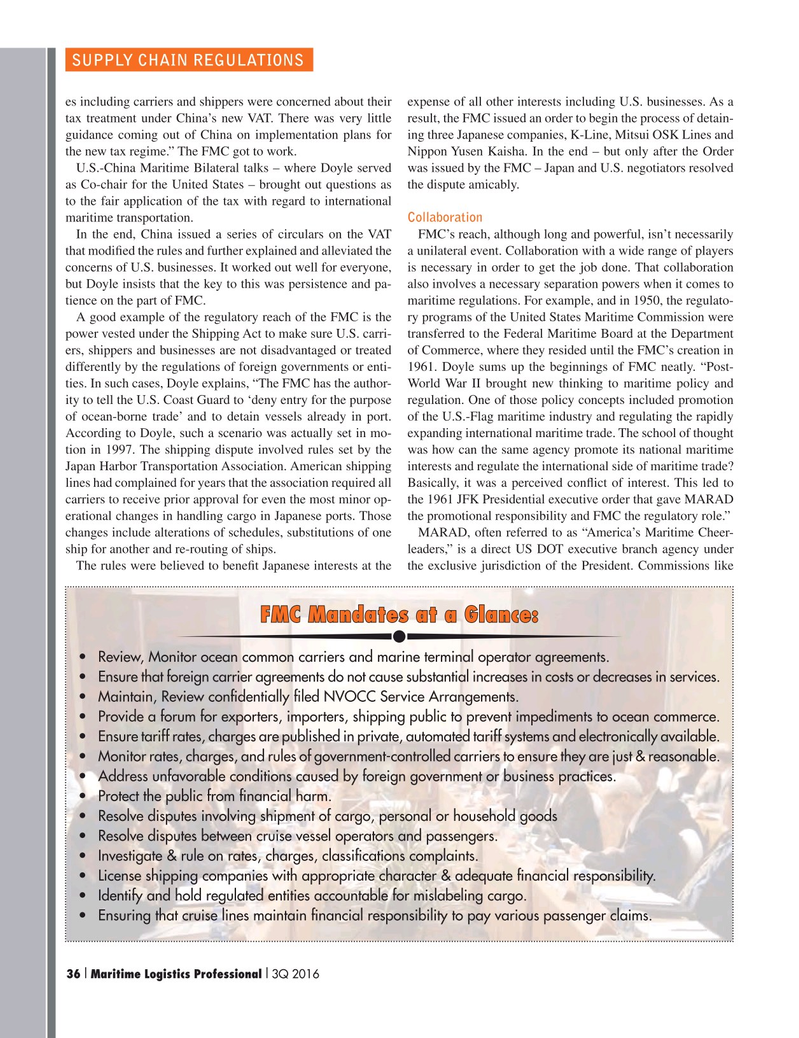
Page 36: of Maritime Logistics Professional Magazine (Q3 2016)
Shipbuilding, Repair & Maintenance
Read this page in Pdf, Flash or Html5 edition of Q3 2016 Maritime Logistics Professional Magazine
SUPPLY CHAIN REGULATIONS es including carriers and shippers were concerned about their expense of all other interests including U.S. businesses. As a tax treatment under China’s new VAT. There was very little result, the FMC issued an order to begin the process of detain- guidance coming out of China on implementation plans for ing three Japanese companies, K-Line, Mitsui OSK Lines and the new tax regime.” The FMC got to work. Nippon Yusen Kaisha. In the end – but only after the Order
U.S.-China Maritime Bilateral talks – where Doyle served was issued by the FMC – Japan and U.S. negotiators resolved as Co-chair for the United States – brought out questions as the dispute amicably. to the fair application of the tax with regard to international maritime transportation. Collaboration
In the end, China issued a series of circulars on the VAT FMC’s reach, although long and powerful, isn’t necessarily that modi? ed the rules and further explained and alleviated the a unilateral event. Collaboration with a wide range of players concerns of U.S. businesses. It worked out well for everyone, is necessary in order to get the job done. That collaboration but Doyle insists that the key to this was persistence and pa- also involves a necessary separation powers when it comes to tience on the part of FMC. maritime regulations. For example, and in 1950, the regulato-
A good example of the regulatory reach of the FMC is the ry programs of the United States Maritime Commission were power vested under the Shipping Act to make sure U.S. carri- transferred to the Federal Maritime Board at the Department ers, shippers and businesses are not disadvantaged or treated of Commerce, where they resided until the FMC’s creation in differently by the regulations of foreign governments or enti- 1961. Doyle sums up the beginnings of FMC neatly. “Post- ties. In such cases, Doyle explains, “The FMC has the author- World War II brought new thinking to maritime policy and ity to tell the U.S. Coast Guard to ‘deny entry for the purpose regulation. One of those policy concepts included promotion of ocean-borne trade’ and to detain vessels already in port. of the U.S.-Flag maritime industry and regulating the rapidly
According to Doyle, such a scenario was actually set in mo- expanding international maritime trade. The school of thought tion in 1997. The shipping dispute involved rules set by the was how can the same agency promote its national maritime
Japan Harbor Transportation Association. American shipping interests and regulate the international side of maritime trade? lines had complained for years that the association required all Basically, it was a perceived con? ict of interest. This led to carriers to receive prior approval for even the most minor op- the 1961 JFK Presidential executive order that gave MARAD erational changes in handling cargo in Japanese ports. Those the promotional responsibility and FMC the regulatory role.” changes include alterations of schedules, substitutions of one MARAD, often referred to as “America’s Maritime Cheer- ship for another and re-routing of ships. leaders,” is a direct US DOT executive branch agency under
The rules were believed to bene? t Japanese interests at the the exclusive jurisdiction of the President. Commissions like
FMC Mandates at a Glance: • Review, Monitor ocean common carriers and marine terminal operator agreements.
• Ensure that foreign carrier agreements do not cause substantial increases in costs or decreases in services.
• Maintain, Review con? dentially ? led NVOCC Service Arrangements.
• Provide a forum for exporters, importers, shipping public to prevent impediments to ocean commerce.
• Ensure tariff rates, charges are published in private, automated tariff systems and electronically available.
• Monitor rates, charges, and rules of government-controlled carriers to ensure they are just & reasonable.
• Address unfavorable conditions caused by foreign government or business practices.
• Protect the public from ? nancial harm.
• Resolve disputes involving shipment of cargo, personal or household goods • Resolve disputes between cruise vessel operators and passengers.
• Investigate & rule on rates, charges, classi? cations complaints.
• License shipping companies with appropriate character & adequate ? nancial responsibility.
• Identify and hold regulated entities accountable for mislabeling cargo.
• Ensuring that cruise lines maintain ? nancial responsibility to pay various passenger claims.
I I 36 Maritime Logistics Professional 3Q 2016 34-49 Q3 MP2016.indd 36 8/17/2016 10:31:45 AM

 35
35

 37
37
